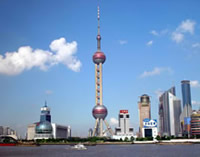|
|


ADVERTISEMENT
Buy Your own advertising
spaces!
.
Download Adobe Acrobat Reader to open [PDF] files.
Recent Visitors
Shanghai takes its Expo seriously
2010. 21 February
Malcolm Moore, Daily Telegraph The occasion is the World Expo, a jamboree of nations that started with the Great Exhibition in London in 1851. In the West, these world's fairs have lost their lustre, held in the decidedly dowdy surroundings of Spokane or Hanover. No one is quite sure what they are for.
(edmontonjournal.com)
It is the biggest event you have never heard of. In the middle of Shanghai, by the banks of the muddy Huangpu River, an area the size of Gibraltar is preparing to receive 70 million visitors.
(Edmonton is preparing a bid for the 2017 World Expo.)
But China has allocated the event -- opening May 1 for six months -- a budget of about $65 billion Cdn, almost twice what it spent on the Beijing Olympics. And the normally restrained Wen Jiabao, China's prime minister, has described the Shanghai Expo as the culmination of a 100-year-long march of history. "It has a huge influence on mankind," says Wen, with a touch of hyperbole.
If the Great Exhibition was the moment that Britain showed off its power, at the height of the Industrial Revolution, then China hopes the Shanghai Expo is its time to shine. Every country wishing to do business here in the future is obliged to attend, meaning that more than 240 nations have spent hundreds of millions of dollars building pavilions. Macau has constructed a giant silver rabbit, Japan has a "Purple Silkworm Island, a lilac dome filled with robots, and Britain has created a fuzzy cube, spiked with thousands of floating fibre-optic cables.
Behind the scenes, diplomats and businessmen are hoping to court China's rich investors.
The shift in the balance of power between West and East can be glimpsed on the Bund, Shanghai's waterfront, where a giant bronze bull is being craned into position. The statue is a replica of the Charging Bull that stands on Wall Street, and is cast by the same artist. But at almost six tonnes, it is twice the size of its American sibling. There could be no clearer statement about the ambition of this city, once the linchpin of Chinese trade with the West, to rival New York, London and Tokyo as a global financial centre.
As with the Olympics, the renovations are breathtaking. With a little more than two months to go before the Expo, every street has been repaved, every building has had a new lick of paint. Six new subway lines have been built. While many of Shanghai's colonial-era architectural treasures are being restored, bulldozers have also razed whole neighbourhoods so the city can look as modern and shiny as possible.
And, as it did in Beijing, the Chinese government has used the Expo as an opportunity to "educate" residents about proper civic behaviour. "People have become much more civilized and well-behaved," says Li Xiaoxuan, the owner of a handbag shop. "Because of the Expo campaign, there has been much less littering, queue-jumping and shouting in the street."
But as the big day approaches, the Communist Party has been seized by a frantic paranoia. Magazines had negative articles censored; one was forbidden to use the word "Expo" on its cover. A local punk band, Top Floor Circus, was called in by the police and given a warning after writing a song that parodies the Beijing Olympic ditty, Beijing Welcomes You. Their version, which includes the lyrics "Shanghai doesn't welcome you, unless you have come to buy something," was instantly banned.
Despite promises to participants in the Expo that Shanghai would not become a police state, security forces are ready to blanket the city from the beginning of March. Reporters, myself included, have been followed by the secret police while conducting interviews. Many activists are planning to leave the city during the six-month event, for fear of being imprisoned in a "black jail," an unofficial and illegal detention centre.
According to one local source, the government has built two new "mental asylums" in the city that will be used to lock up dissidents.
At the end of last month, almost a thousand Shanghainese marched on Beijing to demand compensation in the biggest rally the city has ever staged. Many of them saw their homes knocked down because of the Expo. For them, its slogan -- "Better City, Better Life" -- which is plastered across the city, has a hollow ring. One protester, Gu Hongbing, accused the Communist Party of "using the Expo as an excuse to develop property and increase property prices across the city. Officials have become rich because of it, and robbed us of our homes."
In the past year, Expo fever has helped push house prices in Shanghai up an astonishing 68 per cent. Yet for Gu, and many others, the work of the artist Chen Hangfeng sums up the mood in the city. He is exhibiting an installation that pokes fun at Shanghai's hubris over the Expo and obsession with money. Its name? Bubble City, Bubble Life.


